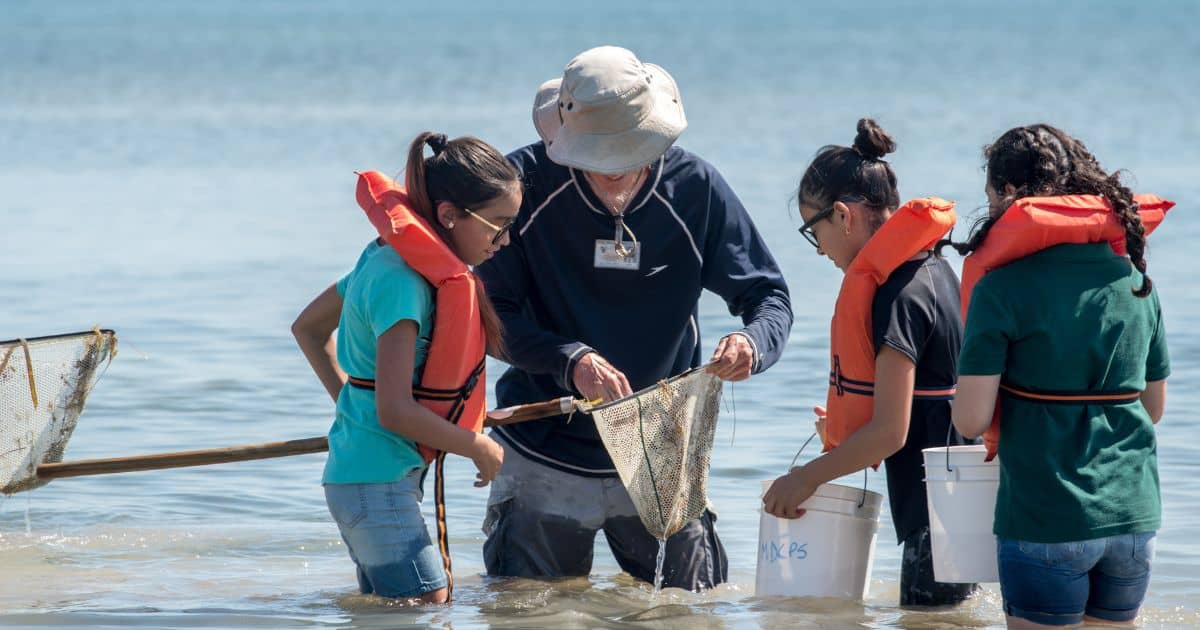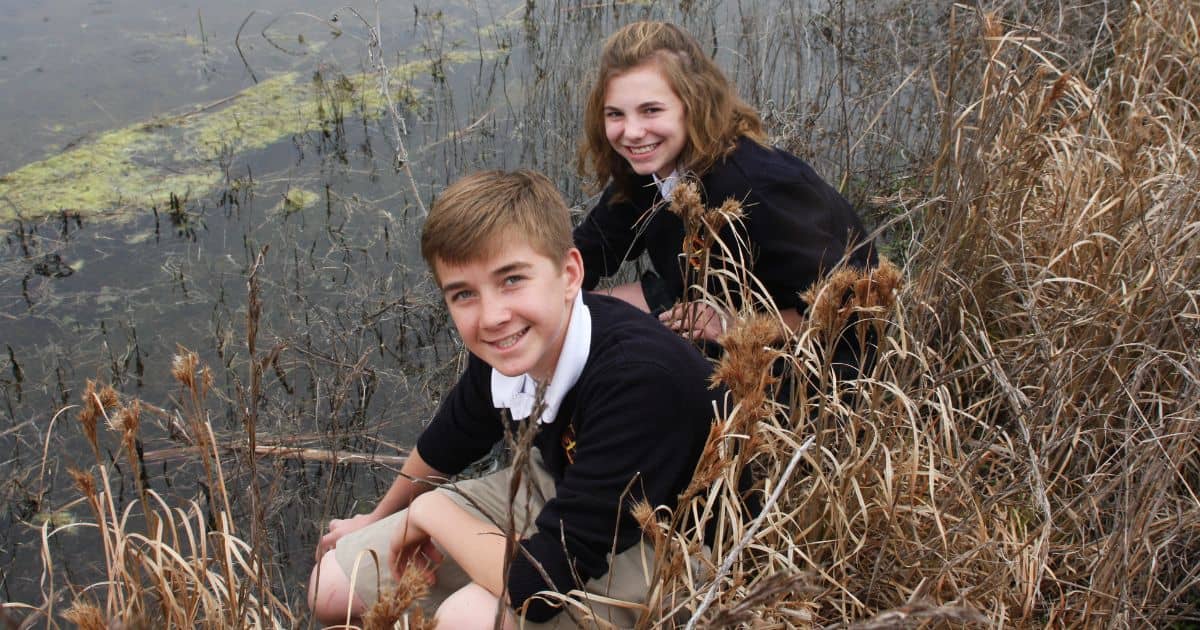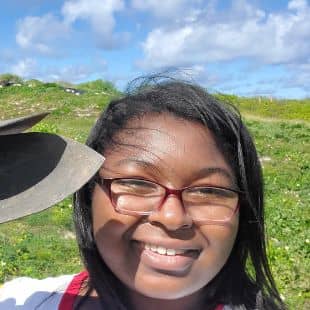Step up for Your Watershed
The ocean and climate are inextricably linked. Covering 70 percent of the Earth's surface, the ocean transports heat from the equator to the poles, regulating our climate and weather patterns. For this reason, climate change – the warming of the earth and all of the critical problems it causes – is fundamentally an ocean issue. And we can all be part of the solution.
“It's pretty fascinating to see how everything is so connected. My grandfather called this planet a water planet, and that’s very apt; even though we live on Earth, we are all living on a water planet.” – Philippe Cousteau talking about his grandfather Jaques Cousteau, the pioneering oceanographer and conservationist
Philippe Cousteau Jr, multi-Emmy-nominated TV host, author, speaker and social entrepreneur and co-founder of Xylem Watermark partner EarthEcho International, spoke with Ivanya Johnson, Senior Water Challenge Ambassador and David Yoon, a member of the non-profit’s Youth Leadership Council, to learn about the innovative actions these students are taking to inspire young people worldwide to act now for a sustainable future, and to transform the future of our waterways.
Philippe: Through our partnership, we strive to spread the message that solving water challenges begins with our local communities with simple, yet innovative action. David, tell us what inspired you to take action, and about the work you’re doing to protect the watersheds in your community?
David: In my hometown, Greenville, North Carolina, we sit at the end of the Tar-Pamlico River, Basin which means that we're the last barrier - we get all the trash and water from everywhere else before it flows into the Atlantic.
“I decided to take action because I was able to witness first-hand the effects of poor water pollution. I observed the impact of microplastics in our waterways through my research at East Carolina University. I was able to see the trash bags in our trees and waterways, and I decided that enough was enough.”
In addition to my work on the Youth Leadership Council, I also co-founded the Environmental Droners, a technology-based initiative dedicated to spreading awareness about the amount of pollution amassing in our local communities. We use technology such as drones to film our local waterways to empower young people to take action. In addition, we helped build the Smart Trash App [still in development but visible here], which can be used to undertake clean-ups around the watersheds users’ communities.
Similar to Google Maps or Apple Maps, the app guides you to trash in your vicinity, and tells you what kind of trash is there, and the human power needed to move that trash. It's an accessible and innovative way that connects everyone around the world to a database of information, enabling city councils, environmental groups, and others to take action.
Within my community we've also started the Floating Island Project, creating “floating islands” made completely of reused single use plastics to build filtering islands that improve natural habitats. Composted mulch was spread over the structures and native plants were added. Our volunteers then helped to float and secure the islands in place. Again, this is something that everyone can do; it provides biodiversity and habitats, while also removing common chemical pollutants from agriculture and landscaping such as nitrogen and phosphorus.
You might be wondering, why is it important that we take out these nutrients when nutrients are supposed to be good for the waterways? Well, if we have an excess of something it’s almost like an overdose - it can kill-off life and actually reduce biodiversity.
Philippe: In addition to trash and debris, invasive species are also a huge issue for our watersheds and one that threatens coastal areas along rivers and along the ocean. Often these plants and animals replace a lot of the native species that are much better at maintaining the health of that coastal habitat. Ivanya, can you talk us through some of the coastal restoration work you’ve undertaken in Hawaii to protect these habitats?
Ivanya: Hawaii is a watershed, from waterfalls to the tops of mountains, down into the Ala Wai Canal and into the ocean. I wanted to get involved in the efforts to remove many of the invasive species, which are inhibiting watersheds all over Hawaii and harming native species such as the albatross. These invasive species replace a lot of the native plants that are often much better at holding soil and in maintaining the health of that coastal habitat.

EarthEcho’s Youth Leadership Council are a team of young environmental leaders who play a key role in leading EarthEcho’s education programs.
The whole point is to not only remove the invasive species but also to allow native species to thrive again. We’re hopeful that our work to clear vegetation will soon result in albatrosses nesting at Kahuka Point once again.
Something else I practiced in Hawaii was making “seed balls” or “seed bombs” – a form of guerrilla gardening, and this is something you can easily do at home using clay, water, and whatever native seeds you want. Wherever you see a piece of derelict land perhaps in your garden or on the side of the road, you simply throw one of the seed bombs over it and let it grow; it's like a mini habitat within a ball of clay. It’s a really fun activity for all ages and it’s a great way to begin reintroducing native species within our communities.
Philippe: EarthEcho’s programs are designed as a path of action for youth to become leaders and change the world. We don't want to sustain the world the way it is – we want to restore it. We want to make it better, and the good news is that we have the tools to do it in our hands, and when you're supported by a company like Xylem, it makes it all that much easier. David, tell us how this support has helped you on your journey?
David: Ultimately, it’s helping us reach more young people to join our course, people with innovative ideas about how we can solve multiple problems with relatively simple concepts, to protect and restore our ocean planet. We must inspire them and give them the tools to continue this important work. We encourage all of you to think about what you can do yourself, with your families, sports clubs and with your communities to make a difference.
There are some really fun ways to get involved in protecting watersheds that are a little bit different; innovations such as floating islands which utilize single-use plastics to remedy nutrient imbalances in our seas.
Ivanya: I 100% agree that impact can start anywhere. I’ve grown up taking part in coastal restoration in my community, for example removing invasive species such as poison ivy.
The best way to learn about the invasive species in our watersheds is to do some research; reach out to local organizations or talk to people in your community. Once you understand what the native habitat looks like you can begin to protect it.

Students take part in clean-up efforts to restore riparian habitats along a riverbank.
Philippe: When you have an unhealthy watershed, you see blocked sewer streams that can cause flooding, you see impact to aquatic animal life, and it also impacts our drinking water supplies as well. So, there's really so many levels to the issue. Beyond plogging and beach clean-ups, what other ways can people make a difference?
David: We worked with a group of elementary school kids in West Virginia to plant trees and restore the riparian habitats alongside the river. The banks had been degraded over time and soil was washing in and muddying the river. Where the river had widened over time it had also reduced the flow, causing stagnant water. Replanting the plants that belong along these riparian habitats help to adjust and fix issues with erosion, pollution and sedimentation. This is a great example of something that everyone can do, that’s fun, engaging, and really rewarding.
Through our work with EarthEcho, we’re committed to executing many other environmental service projects in our local communities and to inspiring and empowering others to take action now for a sustainable future. It’s so easy to make a real difference, and a really fun way of getting out in nature with friends, classmates and colleagues.
Inspired by Ivanya and David’s leadership in their communities? View the simple actions we can all take to protect our local watersheds by taking part in Xylem Watermark’s Watershed Bingo.
About the EarthEcho Team
 Multi-Emmy-nominated TV host, author, speaker and social entrepreneur Philippe Cousteau Jr. is also the founder of EarthEcho International, EarthEcho International is a nonprofit dedicated to building a global youth movement to protect and restore our ocean planet, a critical part of creating a sustainable and equitable future for all. With programs in North America, Australia, the United Kingdom and Europe, EarthEcho directly engages thousands of youths each year. Among other environmental productions and ventures, Philippe and his wife Ashlan are producers and narrators of a new Virtual Reality ocean exploration experience Drop in the Ocean, and co-authors of Oceans for Dummies. He serves on the National Council of the World Wildlife Fund where he is a partner in their Natural Security campaign. He also serves the boards of Green 2.0 and the Environmental Media Association and is a member of the Ocean Unite Network.
Multi-Emmy-nominated TV host, author, speaker and social entrepreneur Philippe Cousteau Jr. is also the founder of EarthEcho International, EarthEcho International is a nonprofit dedicated to building a global youth movement to protect and restore our ocean planet, a critical part of creating a sustainable and equitable future for all. With programs in North America, Australia, the United Kingdom and Europe, EarthEcho directly engages thousands of youths each year. Among other environmental productions and ventures, Philippe and his wife Ashlan are producers and narrators of a new Virtual Reality ocean exploration experience Drop in the Ocean, and co-authors of Oceans for Dummies. He serves on the National Council of the World Wildlife Fund where he is a partner in their Natural Security campaign. He also serves the boards of Green 2.0 and the Environmental Media Association and is a member of the Ocean Unite Network.
 David Yoon, a Youth Leadership Council Member at EarthEcho International, has spent his whole life interested in the environment. Living in Greenville, New Carolina, home of the Tar and Neuse River, he was able to experience first-hand the effects of plastic pollution in our environment, so he understood the need for change – and quickly became that change. Starting in the summer of 2019, David led, engaged, and mentored over 2,500 underserved youth in outdoor STEM-focused environmental activities. Among other sustainability focused initiatives, he is also the founder and Executive Director of Plastic Free New Carolina (PFNC), an umbrella organization dedicated to uniting and empowering youth leaders to increase global efforts to tackle environmental and social issues.
David Yoon, a Youth Leadership Council Member at EarthEcho International, has spent his whole life interested in the environment. Living in Greenville, New Carolina, home of the Tar and Neuse River, he was able to experience first-hand the effects of plastic pollution in our environment, so he understood the need for change – and quickly became that change. Starting in the summer of 2019, David led, engaged, and mentored over 2,500 underserved youth in outdoor STEM-focused environmental activities. Among other sustainability focused initiatives, he is also the founder and Executive Director of Plastic Free New Carolina (PFNC), an umbrella organization dedicated to uniting and empowering youth leaders to increase global efforts to tackle environmental and social issues.
 Ivanya Johnson, a Senior Water Challenge Ambassador with EarthEcho International, is also an aspiring Marine Biologist and Shark Conservationist and an upcoming Junior at Hawai'i Pacific University. Ivanya is a certified Rescue Diver and a volunteer at Fort Fisher Aquarium.
Ivanya Johnson, a Senior Water Challenge Ambassador with EarthEcho International, is also an aspiring Marine Biologist and Shark Conservationist and an upcoming Junior at Hawai'i Pacific University. Ivanya is a certified Rescue Diver and a volunteer at Fort Fisher Aquarium.
She is also a certified Water Safety and Swim Instructor through the American Red Cross and a volunteer with Love A Sea Turtle. Ivanya created an organization called 'Minority Matters Scuba' where she educates minority youth and their parents about the ocean, sharks, marine sciences, and so much more.

